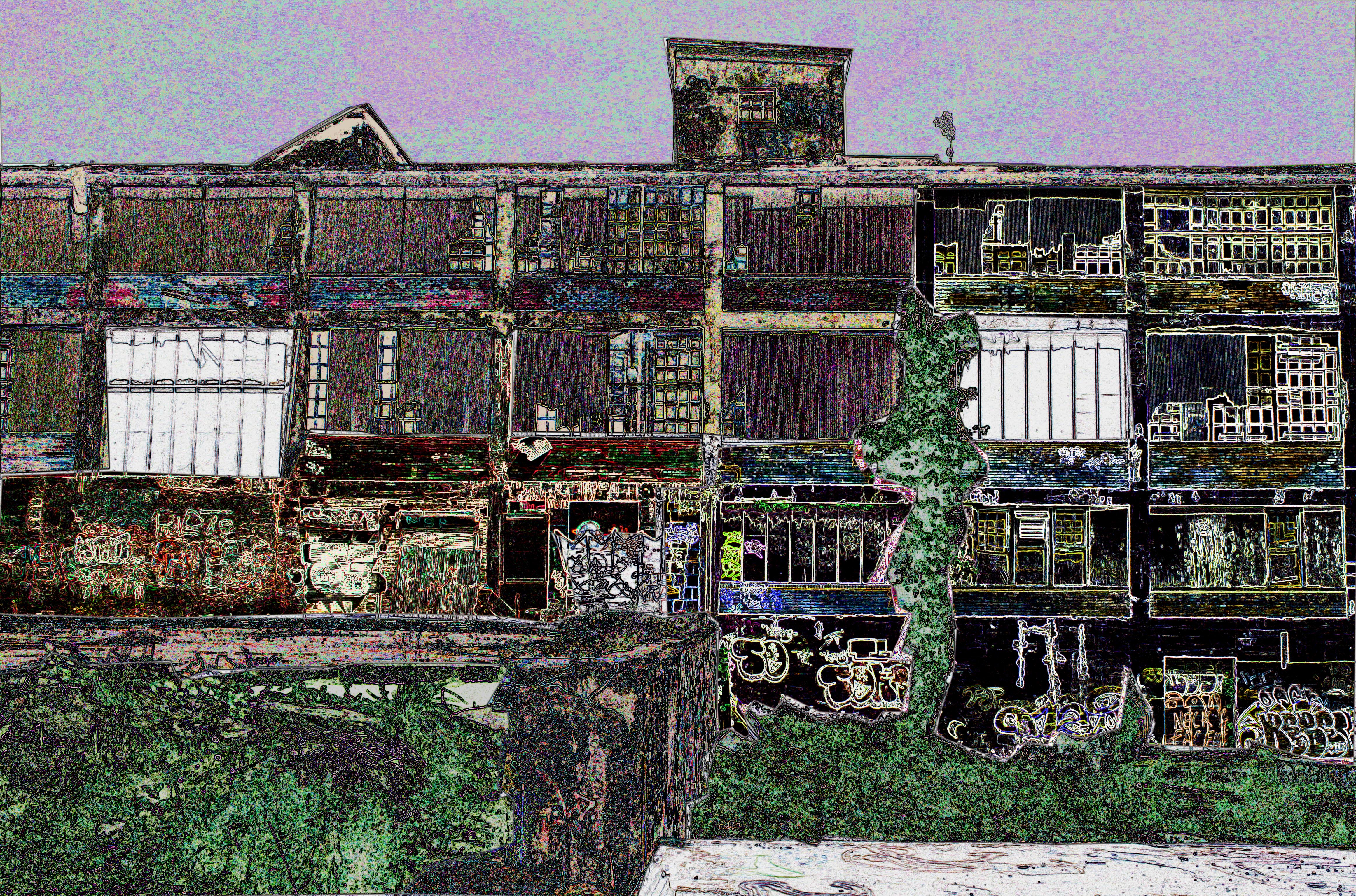So it is. I’ve been crunching away on line edits all week and having a good time. The weather has been pleasant, at least compared to last week, and a couple of mornings I’ve been able to turn off the air and open the windows while working. I loaded up the CD changer with classical—Respighi, Strauss, Grieg—and did fresh ground coffee.
During breaks, I’ve been playing with pictures again. You know, you make damn near anything fascinating, even beautiful in a dark, bizarre way, with enough patience and mods. For instance:

Someone pointed out that in the past something like this would have taken a dozen Kodalith masks and posterization steps. There are about fifteen or so steps in this image and I think it could be a bit better.
We’ll see a friend tonight, go to a really cool party tomorrow night, and Sunday join our reading group to continue Canto X of Dante’s Paradiso. Maybe I’ll get together with some musicians Sunday afternoon to rehearse a couple of things.
Walk the dog.
I’m ignoring the politics going on right now. Just too pathetic to contemplate. Maybe next week.
For now, just relax and chill and enjoy the moment. That’s my plan.
If the above image is a little too weird, let me leave something here a little more normal. But not too normal. Have a good weekend.


“Midway through the journey of my life I awoke to find myself in the Dark Wood Of Error”….
As a Dante expert (studied for 7+ years), I’m curious which translation(s) you are using? Pinsky’s is terrible, but the rest are all OK in their own way. The problem is that modern Italian (as we and Italy knows it) was essentially “fathered” by Alighieri: his “sweet new tongue”. The translations make a difference, unless you are reading them in their native tongue that is.
It was Dante who made me realize that hell would have to be cold by definition (the farthest point from god’s love (warmth) would by definition be cold: allegorically, idiomatically (in Dante’s Sweet new tongue), and literally if you are a diest in any way.
How do you feel of his work? Have you tackled “La Vita Nuova” yet? Hard to find, but WELL worth the effort!
Good luck!
BTW: I named my kids in Dantean theme: Beatrice, Veda (yeah its a smidgen different from “vita”, but has the same translational meaning (“life”). 🙂
Our group is up to Canto XII of Paradiso now. I agree, the Pinsky was not only worthless, but awkward.
We’re using a variety and reading aloud to compare translations. There’s a Sayers, a Mandlebaum, Sinclair and Singleton (of course!), and I’m using a new one by Esolen. We do go through the Italian first.
I’m finding the work not at all what I originally expected. So far, this is the only work by Dante I’ve touched. I’ve come to the conclusion that he wasn’t writing about god at all nor humanitie’s relation to any of that, but of systems and our use (and mis-use) of them. The key to this is here in the third book. How some of these people could, in any conceptualization of traditional religious cosmogeny, actually end up in Paradise makes little sense unless the point is their own choice of dedication to what they perceive as Truth.
Anyway, thanks for stopping by.
Very astute. Things to remember when working the DC: the church was the highest form of government, handing down the rules of engagement to the secular underlings – and during this period, corruption was so bad that it makes today’s America look like a kindergarten class.
Dante was an active fighter in the wars, and suffered exile, loss of offices, etc., and had no recourse to address any of the wrongs he had either suffered or seen directly. The DC is a hyper political work, without question, just look at how he hands out sentences commensurate with the crimes of the folks down in hell (and note that he considered his unbaptised “brothers” such as virgil to be not so much in hell, but as in a state of unattainable grace.
As you work your way through each of the three works he becomes less and less cryptic about purpose, while simultaneously becoming more and more difficult to read. I’ve met few people who cannot read Inferno, while I know a whole lot of people who cant get half way through Purgatorio, let alone Paradisio.
I would not have attempted to tackle the entire DC without starting with LVN as background: maybe that’s good, maybe it’s ridiculous, but I have found it helped a few of my friends who could not otherwise undertake the entire commedia reach it’s conclusion (and conclusions!).